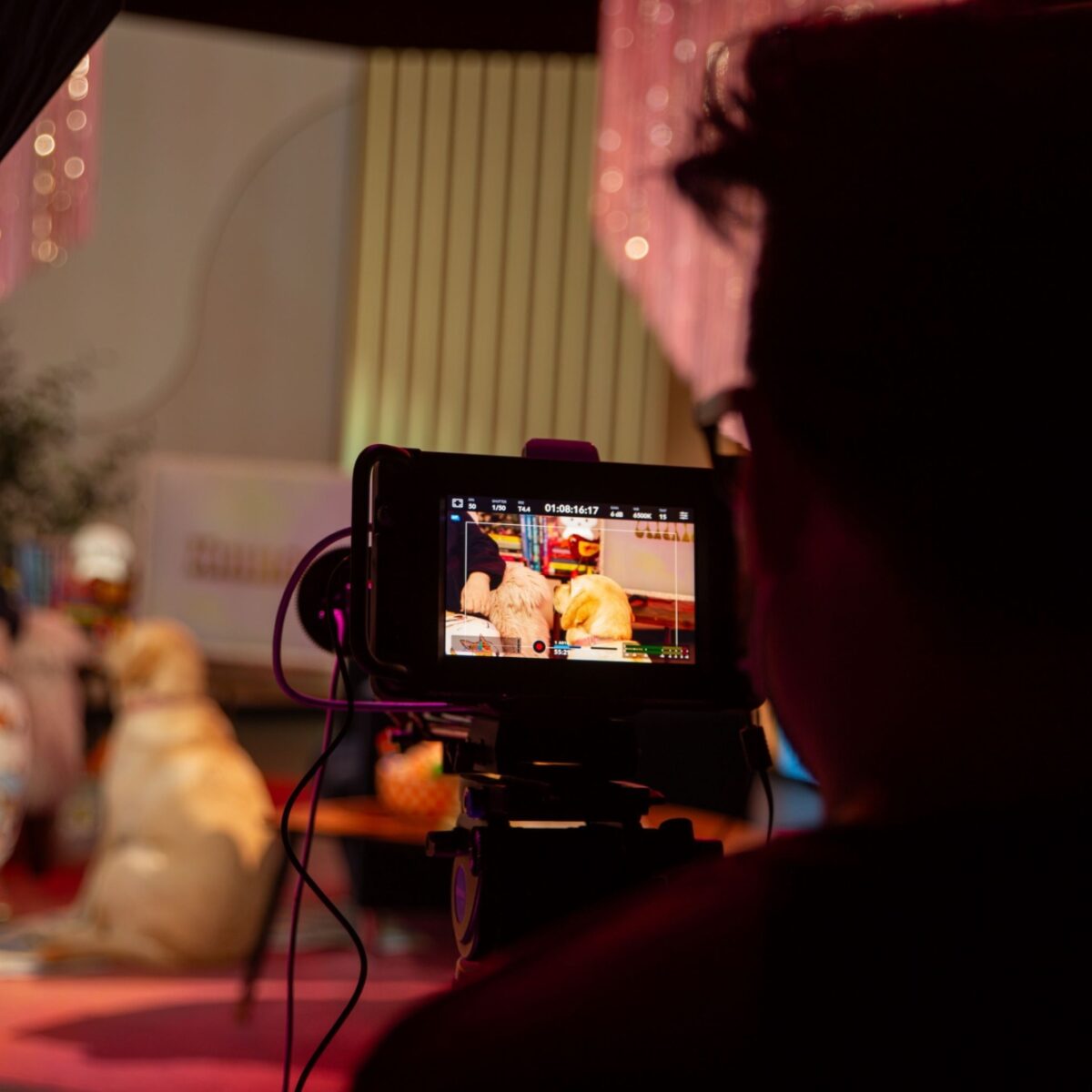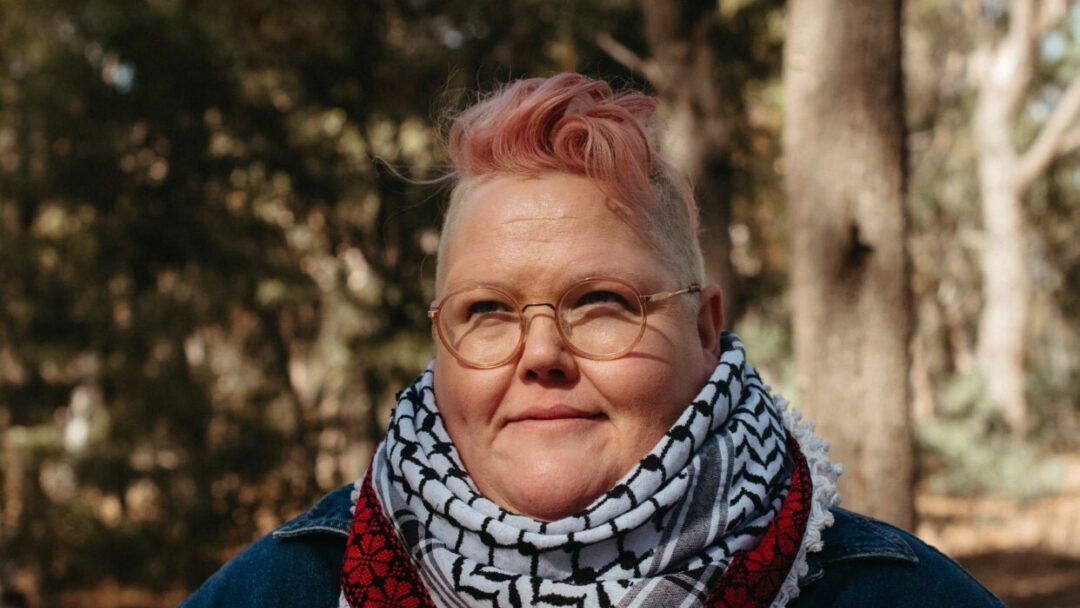Article
A few years ago I spoke on a panel at a tertiary educational institution with other disabled writers and speakers. It was quite a soiree. Cater waiters circled the room wearing crisp white shirts and black aprons, offering gleaming trays of canapes and champagne. I wondered how many days of disability support pension each tray would have come to when converted to dollars budgeted for the evening. I didn’t take anything offered to me, preferring to leave my mask on.
In a moment that surprised me, I was triggered by my own poem. Describing a dicey stay in hospital, the idea was to convey the reality of living in a politicised, disabled body, and engaging with larger systems. Ostensibly there in the name of care, these systems often result in grave damage to disabled people’s mental and physical health. When I enter a hospital, the hallway reliably shrinks to a dot as I attempt to navigate the expanse of what it means to willingly set foot in the building. That I hand my power over, to an extent, and having the lived experience of that resulting in violence and contempt, I never relinquish that control completely. Going to hospital is exhausting when you’re always keeping one eye open, just in case.
Reading the poem exploring these themes to the audience unexpectedly jolted me back to that fearful exhaustion and dismay. The room held many disabled writing colleagues, but the majority of the crowd were medical professionals.

It was strange to sit on the elevated stage. Usually very comfortable with public speaking, this event felt charged and I experienced the odd sensation of being a specimen under glass. Being watched by a room filled with a majority of those with the higher position in our power imbalance, I felt the familiar white coat fever that sets my adrenals off in clinical spaces. As my usual confidence and joy found in literary spaces ebbed away, what remained was an itching mix of fear and defensiveness. I wanted to defend myself, but it was more about having the microphone to speak on behalf of an entire community. We had a captive audience in a manner unlikely to be repeated.
As the panel discussion went on, I felt the galloping horses in my chest urging me to do something, anything, to ensure the time was well spent. I looked around and noticed what the people on stage had in common. We were confident and experienced speakers, performers, and in many ways a palatable example of disability. Ambulatory, verbal, white. I felt deep shame for inadvertently taking the place of someone else who could have spoken to the parts of intersectional disability that I could not.
At one point something exploded inside of me and I responded to a question about my hopes for the future by asking the assembled medical establishment what the fuck they were planning to do about all this. That it was all well and good to show up, to listen to us prior to the promised networking opportunity, but as the literal abusers of a marginalised minority, what steps would they take to stop premature deaths and multi-faceted harm? That I understood the constraints of resources and systems, but when a doctrine is proven to result often in complex trauma for patients, how could they as individuals reconcile being a major part of that? We are telling you that all of us have been hurt by medicine as a system and as a culture. My voice was loud, my eyes flashing darkly with a cleansing rage, but my hand was steady.
It felt right to be less polite and grateful, less palatable.
My adrenaline surged right down the drain and left me feeling like I often do following energy expenditure, like a sad dirty tea towel after a dinner party.
I grimaced as the MC cheerfully quoted me in his final statements, asking the audience rhetorically what the fuck were they going to do about it, before swiftly announcing some exciting tech projects the facility were working on.
As the applause died down and the networking began, I was mobbed by GPs, specialists and surgeons. One informed me that she was one of the good ones, and it wasn’t right to criticise the establishment. Another asked where my children went to school, and what their names were. When I faltered before responding that I don’t share that information with strangers, they wandered off, miffed at my unwillingness to answer their questions. Deep in conversation with another white coated human who seemed curious and interested, I was mid-sentence when he turned his back on me. A more profitable conversation opportunity had appeared at his elbow.
I was both astounded by all of this, as well as being completely unsurprised. It took a long time to process and piece together what had happened and how I felt about it.
There’s a lot in this, about trauma and community, solidarity and challenges, but the palatability aspect is what sticks out most for me. How in order to be heard, disabled people are usually expected to capitulate to the methods and access standards of our oppressors.
Feedback can be provided over email (requiring literacy and confidence) to imposing juggernauts that could keep our complaint on file, punishing us for it the next time we need medical care. We can vote, or communicate with our local members about the issue, and receive formulaic responses that have many words but ultimately say and do nothing, sapping energy and will to keep up the fight.
The people who can make changes also exist in large formidable systems that aren’t accessible to most disabled people. The voices of our counterparts who experience disability in ways that are uncomfortable or confronting for the majority are excluded and discounted as too angry or dangerous.
The NDIS continually ignores access requirements on file of participants when engaging with us, springing out of the blue Plan review meetings over the phone. This seems to be by design, to disorient and remove agency from those of us who have things to say about what we need and why.
When considering the presence of disabled representatives on social media, I very much enjoy Khadija Gbla, Charlie Park, Renay Barker-Mulholland, Sam Petercine, Sonny J, Siobhan Simper, Candy Courn and Themme Fatale for their candour and honesty. They communicate in ways I find clear that stand out in contrast to the many polite and highly polished representations of disability. By stating their realities in ways that aren’t eternally shiny and smiley, they represent the notion that you don’t have to be a person grovelling for approval in the face of discrimination. There’s a lot of energy that goes into creating content for social media, and each of these accounts has helped me beyond measure.
If you notice a disabled person who is unashamedly, staunchly and unpalatably themselves, why not celebrate them today by sharing some of their content. The more presence we have, the easier it is for us to rise above the limitations placed on us.
Sometimes just to know that other people exist who are pissed off and exhausted and channel that into representation of what disability can look like from the outside, is a life saver. It flings spoons in our direction. The words to describe our experience are there, they’re real, and we can be galvanised by this shared understanding.
Like Abbi and Ilana from Broad City, flipping the bird at a dude on the street who told them to smile because they’re so pretty, speaking truth to power is often more necessary than being palatable.
